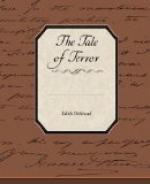To read Vathek is like falling asleep in a huge Oriental palace after wandering alone through great, echoing halls resplendent with a gorgeous arras, on which are displayed the adventures of the caliph who built the palaces of the five senses. In our dream the caliph and his courtiers come to life, and we awake dazzled with the memory of a myriad wonders. There throng into our mind a crowd of unearthly forms—aged astrologers, hideous Giaours, gibbering negresses, graceful boys and maidens, restless, pacing figures with their hands on their hearts, and a formidable prince—whose adventures are woven into a fantastic but distinct and definite pattern around the three central personages, the caliph Vathek, his exquisitely wicked mother Carathis, and the bewitching Nouronihar. The fatal palace of Eblis, with its lofty columns and gloomy towers of an architecture unknown in the annals of the earth, looms darkly in our imagination. Beckford alludes, with satisfaction, to Vathek as a “story so horrid that I tremble while relating it, and have not a nerve in my frame but vibrates like an aspen,"[68] and in the Episodes leads us with an unhallowed pleasure into other abodes of horror—a temple adorned with pyramids of skulls festooned with human hair, a cave inhabited by reptiles with human faces, and an apartment whose walls were hung with carpets of a thousand kinds and a thousand hues, which moved slowly to and fro as if stirred by human creatures stifling beneath their weight. But Beckford passes swiftly from one mood to another, and was only momentarily fascinated by terror. So infinite is the variety of Vathek in scenery and in temper that it seems like its wealthy, eccentric, author secluded in Fonthill Abbey, to dwell apart in defiant, splendid isolation.
It is impossible to understand or appreciate Vathek apart from Beckford’s life and character, which contain elements almost as grotesque and fantastic as those of his romance. He was no visionary dreamer, content to build his pleasure-domes in air. He revelled in the golden glories of good Haroun-Alraschid,[69] but he craved too for solid treasures he could touch and handle, for precious jewels, for rare, beautiful volumes, for curious, costly furniture. The scenes of splendour portrayed in Vathek were based on tangible reality.[70] Beckford’s schemes in later life—his purchase of Gibbon’s




